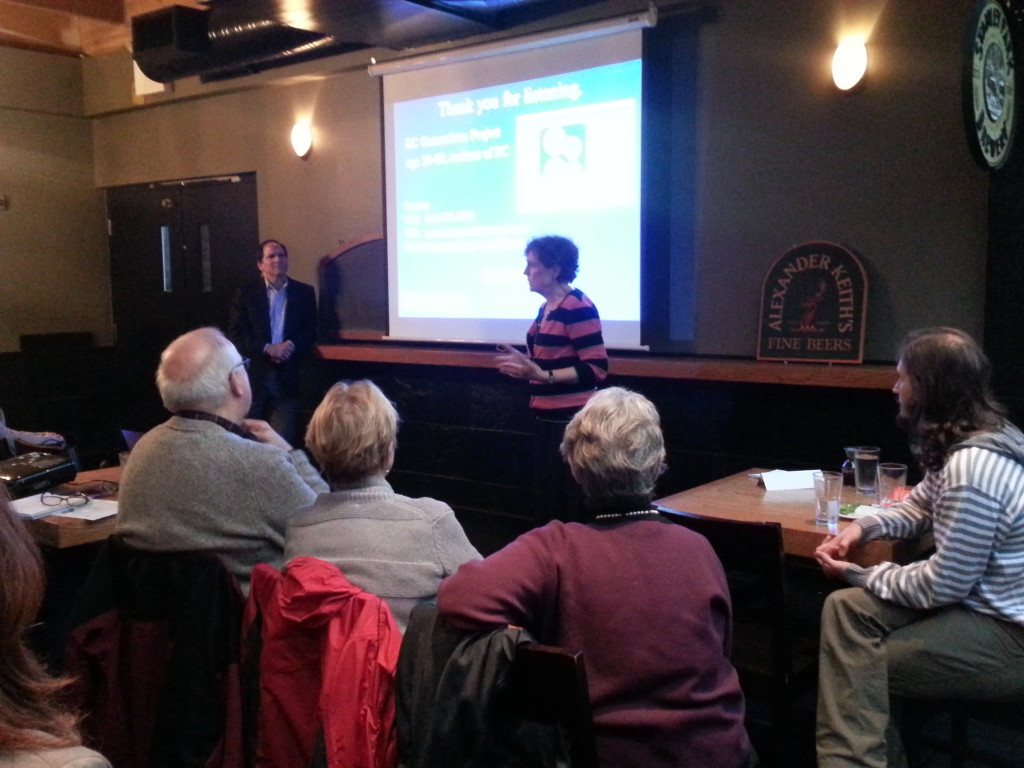“Cancer Prevention: It’s Not Just Your Genes” [Event Recap]
Back to Posts
On April 3 2014, IWIS hosted the third Cafe Scientifique to discuss the risks factors and preventive strategies of cancer.
Our first speaker was Dr. Carolyn Gotay, who is a Professor at UBC and Canadian Cancer Society Chair in Cancer Primary Prevention. She shared important facts related to cancer prevalence and incidence in Canada, comparing rates among provinces. Despite the fact that more people are being diagnosed, there are more cancer survivors today. She went on to comment on a citation from the Annual Review of Public Health published in 2013. In Canada and US, 60% of cases are potentially preventable, and only 5 to 10% of cancers are due to inherited genes. The potential risk factors include: tobacco, alcohol, Ionizing radiation, solar radiation, occupation, infectious agents, excess body mass and physical inactivity. Dr. Gotay pointed out that smoking cessation has improved in Canada, however, some provinces are doing better than others. For example, British Columbia had the lowest rate of tobacco use whereas the Territories and Maritimes were amongst the highest. Finally, Dr. Gotay discussed the aims of the UBC and Canadian Cancer Society collaboration, which includes promoting connections between researchers, providers, and policy makers, translating research findings, increasing cancer prevention research capacity, and increasing cancer prevention research activities.
Dr. John Spinelli, is a Professor at UBC and Department Head at Cancer Control Research, BC Cancer Research Centre. Dr. Spinelli began his presentation with information regarding the importance of the environment in cancer causation, pointing out that 40-60% of cancer cases are explained by known causes. He discussed a list of carcinogenic agents which included such items as: alcohol, aluminum production, arsenic, asbestos, benzene, formaldehyde, and Hepatitis B and C viruses, Helicobacter pylori, HIV and Human papilloma Virus. Dr Spinelli presented an overview of the interaction of genetics, environment, diet and lifestyle, and the role of these interactions on cancer pathogenesis. Finally, he explained about the Canadian Partnership for Tomorrow Project which focuses on the factors related to disease risk, such as environment, lifestyle and genetics, and it’s expected to study all cancers and chronic diseases.
Our moderator for this event was Artem Babaian and he’s a graduate student under the supervision of Dr. Dixie Mager’s in the Terry Fox Laboratory located in the BC Cancer Research Center. Artem’s research focuses on “junk DNA” in the human genome and how it is used in the evolution of new genes.
We would like to take this opportunity to thank our speakers, moderator and volunteers. Thank you everyone for participating in this stimulating and exciting discussion. We look forward to seeing you all at our next Cafe Scientifque on May 8. The topic of this event will be “Breast and Ovarian Cancer – Not Only a Disease for Older Women“. Registration will open soon. Stay tuned to reserve your space!.
Written by: Blanca Rodrigue
Edited by: Pam Arstikaitis



